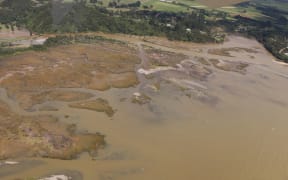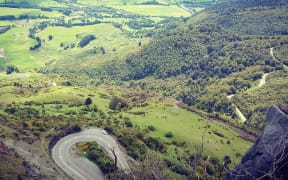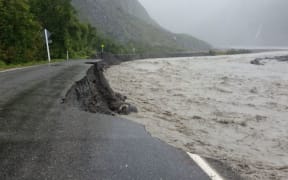Two large ex-tropical cyclones that dominated February weather in the top of the south are linked to the region's biggest slump in business confidence in several years.
image:146066:full] The Southern Alps behind Greymouth.
The Westpac-McDermott Miller Regional Economic Confidence survey for the March quarter - out today - shows confidence has grown in nine out of 11 regions.
Otago posted the largest drop in confidence for the coming year, due to drought conditions and growing worries about how the region might deal with an expected increase in tourists.
Nelson, Marlborough and the West Coast scored the country's second least optimistic result.
Only 13 percent of households in the region are optimistic, which is a 33 percent drop from the previous quarter.
Westpac industry economist Paul Clark said the slump in confidence in the top of the South Island comes on the back of solid growth over the past several years. He said the survey was linked to household economic confidence, and how they saw the future.
"It was a significant fall from 33 percent down to 13. The primary reason for that essentially, was the impact of some of these extreme storm events we saw earlier in the year," he said.
The storms at the start and end of February caused widespread disruption and damage across the region, including roads and bridges being washed out and damage to horticultural and forestry businesses.
Riwaka apple grower Evan Heywood is now pulling out three hectares of prime apple orchard, including the variety of apple called Envy, after it was destroyed by flooding and slips during ex-tropical Gita.
"Envy is a high-paying variety and a very productive variety. It was our best block. We're talking 15,000 or 16,000 cartons we'll lose, which is significant."
It came only months after he was among several growers suffering losses from the effects of a bad batch of fungicide applied to crops unwittingly.
He said they were still working through the compensation process.
Mr Heywood said he was getting help from a government-sponsored labour initiative, Taskforce Green, to help tidy up the destroyed orchard. He said it would be seven or eight years to get back to pre-storm production levels.
The government has also offered relief packages to businesses suffering losses from the closure of State Highway 60, over the Takaka Hill. Traffic has been restricted to convoys at set times, as work continues to repair badly damaged sections of the road.
More than one in five of 84 Golden Bay businesses that responded to a recent survey reported business had fallen by 80 to 100 percent. Homes and productive land in Marahau was also severely damaged.
Cyclone Fehi, earlier in the month, caused significant damage to homes, businesses and properties the length of Tasman Bay, from Nelson City to the Abel Tasman National Park.
Westpac chief economist Dominick Stephens said falling house prices in Marlborough and the West Coast, and sharply lower house sales volumes across the region, were also likely to have affected the mood in the top of the south.
"Households in these regions are still reasonably confident about the prospects for the New Zealand economy over the next 12 months, although an increasing number have indicated that they are more uncertain than they used to be," he said.
Paul Clark said the data was collated from 1522 survey respondents around the country.
"In some cases you get drops that are technical in nature and they have a big impact on some of these movements. It can move up and down but in this case we could attribute it those certain [weather] factors."
Mr Clark said the top of the South Island and the West Coast was a huge region, and the results were a summary.
The survey also showed that all of the regions that recorded a drop in regional economic confidence in the December posted increases March.





